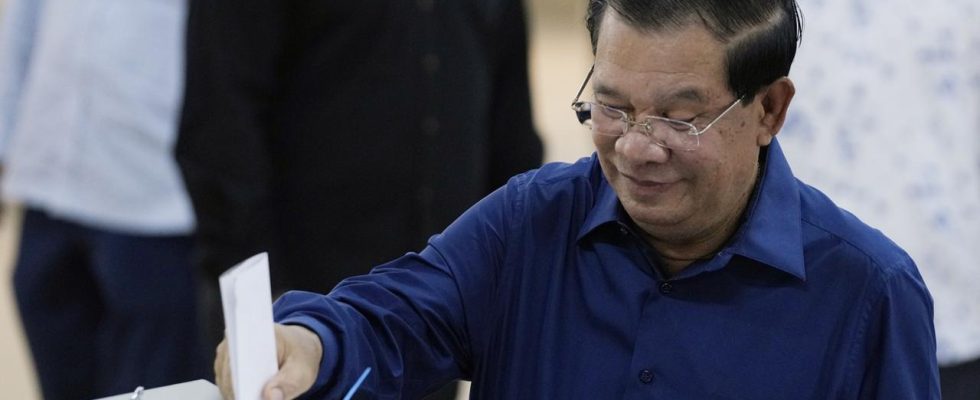After almost 40 years as Cambodia’s prime minister, Hun Sen has been elected to another term. However, he did not have to fear competition: the largest opposition party was banned from participating.
As expected, long-term Prime Minister Hun Sen and his Cambodian People’s Party (CPP) secured power in the parliamentary elections in Cambodia. Party spokesman Sok Eysan spoke of a “landslide victory”.
According to the preliminary results, the CPP received 82.3 percent of the votes. 9.2 percent voted for the Funcinpec party, the remaining 8.5 percent went to 16 other small parties. Accordingly, the CPP has at least 120 seats in the 125-strong National Assembly, as the newspaper “Khmer Times” reported, citing the election commission.
competition out of the way
Hun Sen has been in power in the Southeast Asian kingdom for almost 40 years, making him one of the longest-serving heads of government in the world. However, the 70-year-old did not have to fear any competition for the election anyway: the opposition has been suppressed for decades. He had numerous critics arrested, banned the media and called for violence against members of the opposition.
The only opposition party with a real chance, the Candlelight Party (CP), was banned from voting in May by the Constitutional Court. You should not have submitted the necessary papers in time. Party officials say they have been hampered by state bureaucracy.
Before the 2018 elections, Hun Sen had dissolved the predecessor party of the CP and had the leader convicted of treason.
Almost ten million people were called to the polls on Sunday. Voter turnout was extremely high at around 84 percent. This was mainly due to the fact that Hun Sen had the electoral law changed a few weeks ago. Since then, calls for an election boycott or attempts to invalidate a ballot paper have been punished. Background: A high turnout should legitimize Hun Sen’s retention of power.
Countries and organizations do not see free elections
Neither the EU nor the USA nor other Western countries sent election observers, as they did not believe that the ballot was free and fair. Only observers from Russia, China and Guinea-Bissau were there when Hun Sen and his compatriots cast their votes.
The human rights organization Human Rights Watch said the election bore “little resemblance to a genuine democratic process”. Phil Robertson, the organization’s deputy director for Asia, compared the political situation in the de facto one-party state of Cambodia before the election with that in North Korea.
Hun Manet, chief of the Cambodian army and eldest son of Hun Sen, points the finger after casting his ballot at a polling station in Phnom Penh.
Observers believe that Hun Sen could make way for his 45-year-old son Hun Manet at the head of government during the next five-year term. Hun Manet is currently the military chief.

